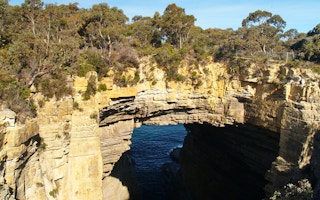In a bid to raise Tasmania’s profile as one of the leading eco-tourism capitals in the world, the Tourism Industry Council Tasmania (TICT) has launched a certification programme for about 700 tourism operators in Australia.
To continue reading, subscribe to Eco‑Business.
There's something for everyone. We offer a range of subscription plans.
- Access our stories and receive our Insights Weekly newsletter with the free EB Member plan.
- Unlock unlimited access to our content and archive with EB Circle.
- Publish your content with EB Premium.
The Tasmanian Environmental Leaders Programme, launched by TICT in partnership with global environmental management and certifications firm EC3 Global last month, will assist tourism operators to measure and track their environmental and social performance against global standards using EC3’s EarthCheck Evaluate programme.
The EarthCheck programme will provide entry-level sustainability measurement tools for tourism operators to evaluate and find ways to improve their economic, environmental and social impact, particularly on operational efficiency, waste reduction and the protection of Tasmania’s natural parks and heritage, said EC3 in a statement.
TICT said that out of the 700 tourism operators, which are all accredited to operate in Tasmania, 91 have already commenced the programme, but the council is still looking to increase the numbers to at least 220.
Tasmania aims to become Australia’s leader in the tourism sector for environmental certification. TICT chief executive officer Luke Martin said the programme was a response to the need for a wholesale approach to sustainability in Tasmania’s tourism industry, which includes all aspects of the tourism sector – from tourism operators to hoteliers, wineries and boat tours.
“
Ultimately, we want all visitors to know that their experience has been thoughtfully and sustainably crafted, and that they are travelling in one of the greatest nature-based destinations in the world
Luke Martin, CEO, Tourism Industry Council Tasmania
“Tourism is worth A$2.4 billion annually to the Tasmanian economy and employs 28,000 Tasmanians, which makes it the second largest contributor to employment in the state,” said Martin.
He noted that visitation in Tasmania alone in the past three years has increased by six per cent, with nature-based tourism gaining more visitors over the years - a massive 31 per cent jump during the same period. This shows that travellers are looking for more eco-tourism experiences, particularly in its UNESCO-listed natural parks and reserves, added Martin.
The Tasmanian Wilderness, which covers an area of over 1 million hectares, is one of the last expanses of temperate rainforest in the world according to UNESCO, which confirmed the rainforest’s World Heritage status again in June last year.
Tasmania’s forests and natural parks are also considered environmentally valuable in reducing Australia’s carbon emissions, according to a government-commissioned forest carbon study conducted in 2012. It reported that Tasmania’s forests contain around three to four billion tonnes of carbon stock - six times the amount of Australia’s average greenhouse gas emissions.
The travel and tourism industry worldwide has contributed US$ 7 trillion to the global economy in 2013 and has provided nearly 266 million jobs, but the industry also contributes up to five per cent of the world’s greenhouse gas emissions, noted Stewart Moore, chief executive officer of EC3 Global and founder of EarthCheck.
“The size and economic potential of tourism highlights the need for operators and communities to deliver sustainable management practices,” said Moore. The industry has to face up to its responsibility to minimise the traveller’s environmental impact, he added.
Tourism operators can benefit from a one-year free service provided under EarthCheck Evaluate and be awarded with an Earth Rating that uses an internationally recognised criteria to gauge their performance on environmental management.
EC3 also emphasised that with the recognition that operators receive for their sustainability efforts, they also avoid the risk of being accused with greenwashing, or making false claims about their sustainability performance and credentials.
“We need to create greater awareness of the range, quality and diversity of the natural experiences that the destination has to offer…Ultimately, we want all visitors to know that their experience has been thoughtfully and sustainably crafted, and that they are travelling in one of the greatest nature-based destinations in the world,” said Martin.








